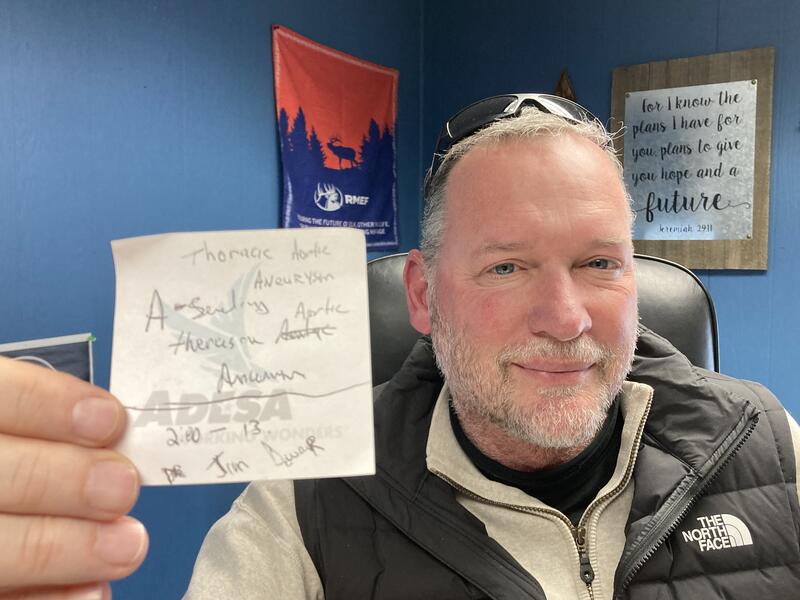Ascending aortic aneurysm. Those were three words Todd Moudry had never heard before.
“I did not know what that meant,” Moudry said. “I still have the note in my desk from when they called me, because I had to come up here and write it down.”
Just one day earlier, Moudry had completed a voluntary heart screening at Sanford Health in Bemidji. As the general manager of a local car dealership, Moudry thought it would be a good idea to get the screening not just for himself, but as a catalyst for his employees at Bob Lowth Ford as well.
“He was actually attempting to be a champion for his team,” said James Dewar, D.O., an interventional cardiologist and Sanford Bemidji’s cardiology chair. “He was trying to coax his team members to go get a screening because he thought there was some value in the program. And lo and behold, it was a real shock for Todd to find the information out that he did.”
Having missed out on a screening at the previous year’s heart drive at Sanford, Moudry was on a list of patients to call for appointments. As part of the screening, he was offered a test which can determine a patient’s coronary calcium score. For $85, Moudry thought the peace of mind was worth it.
“I was about to go elk hunting. So I thought, why not? Let’s go,” Moudry said. “I told them I would rather see the unseen.”
Blood vessel near breaking point
In this case, the unseen was a bulging artery next to his heart, caused by a defective heart valve. The ascending aorta had ballooned to 5.9 centimeters in diameter – nearly the size of a soda can.
“These are extremely dangerous conditions if not picked up early,” said Dr. Dewar. “Once it reaches a maximum size of dilation, folks are at a very high risk for spontaneous rupture. If someone ruptures, they usually die within minutes. If you are not already in a hospital on the table, there’s a good chance that you’re not going to make it.”
Understandably, Moudry’s mind was racing.
“I did the worst thing ever and Googled what this means, and I knew immediately it’s not good,” Moudry said.
He would need open heart surgery.
Moudry’s sister-in-law has worked in a cardiology department for more than 25 years in Eau Claire, Wisconsin, so Moudry had his procedure done far from home. It took just three weeks to go from screening day to surgery day, from life-threatening to lifesaving.
Now 53, Moudry has a mechanical valve in his heart. He says doctors expect him to live a normal, healthy life thanks to that replacement part. And with a new lease on life, Moudry used his new contact as a business opportunity, just like any good car salesman would.
“I did sell my surgeon a brand-new Ford Explorer,” Moudry said with a smile.
Importance of screening
Dr. Dewar believes heart screenings are something everyone should consider.
“You never know what you’re going to find,” Dr. Dewar said. “You never know what genetics you’ve inherited until you’ve been tested. You don’t know if you’ve developed normally. The value of screening is that it really is for almost everybody.”
He does say that some patients are more likely than others to have heart problems though.
“Anybody with multiple risk factors for coronary disease should get screened,” said Dr. Dewar. “People with diabetes, people who have smoked, people with longstanding hypertension, with family history of heart problems.”
For Todd Moudry, taking his heart screening seriously was one of the best decisions he’s ever made. Today he remains a champion for taking the test, not just for his coworkers anymore, but for anyone who will listen.
“I hope the Bemidji community really appreciates that we have a cardiac team as good as what we have here. We’re lucky,” Moudry said. “I thought I was healthy. You can think that, but you don’t know. Compared to the rest of your life, $85 total. Why would you not do it?”
Learn more
- Heart screening saves life of 59-year-old farmer-mechanic
- Heart and vascular screenings: What’s the difference?
- Coronary calcium screening reveals hidden heart problems
…
